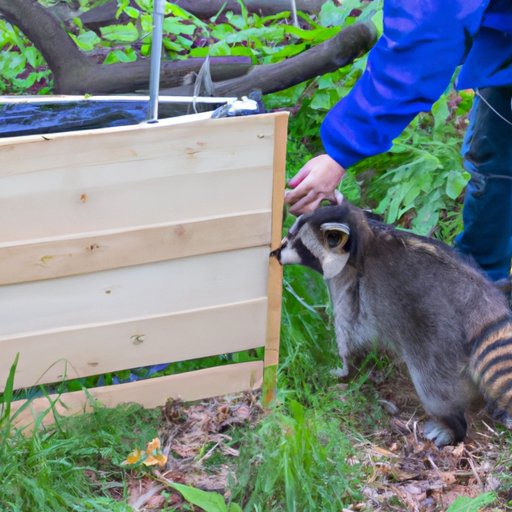I. Introduction
Raccoons are cute and fascinating animals, but only when they are not wreaking havoc in your yard or home. These clever and adaptable critters are notorious for causing damages to properties, spreading diseases, and making a mess. For this reason, it’s essential to find ways to get rid of raccoons if they become a problem. This article will provide you with a comprehensive guide on how to safely and effectively eliminate raccoons from your premises using different methods.
II. Trapping and Relocating
Trapping and relocating raccoons is a humane way of getting rid of them while avoiding any harm. When done correctly, it can be highly effective. To trap raccoons:
– Place the trap in an area where raccoons frequent, such as near a hole in your fence or a tree they climb.
– Use bait that the raccoons are attracted to such as sweet corn or canned cat food.
– Check the trap regularly and relocate the raccoon to an area far from your home.
It’s important to keep in mind that trapping and relocating raccoons is illegal in some states, as well as inhumane if you don’t release the animal in a suitable environment. Always contact your local animal control prior to trapping raccoons.
III. Securing Your Trash
Raccoons are attracted to garbage, which is an easily accessible food source for them. To avoid this:
– Use tightly fitting lids or locking clips on your trash cans, and secure them tightly.
– Store your trash cans in a shed, garage, or any secured area if possible.
– Clean your trash cans frequently after they’re emptied to avoid any lingering odors.
IV. Removing Food Sources
Removing food sources that attract raccoons can be highly effective at getting rid of them. Any outside food source should be removed or secured in enclosed containers. Other tips include:
– Keep pet food and water bowls inside during the night.
– Pick up any fallen fruits or nuts from your trees.
– Remove all bird feeders, which serve as a common food source for raccoons.
V. Installing Motion-Activated Lights or Sprinklers
Motion-activated lights or sprinklers can scare off raccoons by startling them. If they detect movement, they will turn on and scare off the animal. Here are some tips:
– Install them in areas where raccoons frequent.
– Place them in areas where there is high-activity at night and avoid installing them on trees, which raccoons can climb.
– Opt for lights or sprinklers that use motion-sensor technology.
VI. Using Repellents
Repellents can also deter raccoons from getting close to your property. They are available in various forms such as sprays, granules, and ultrasonic devices. However, some repellents may not be safe for pets or children, so use them with caution and follow the instructions carefully. Here are some tips:
– Use natural repellents like ammonia or vinegar.
– Commercial repellents use chemical compounds such as pepper, essential oils, or predator urine smell.
– Apply repellents only in areas where raccoons frequent.
VII. Fencing Your Property
Fencing your property is an effective long-term solution to keep raccoons out. You can even go for electric fencing, which sends a gentle shock to animals that come in contact with it. Here are some tips:
– Use wire mesh fences with metal or wood posts.
– Opt for fences that are at least six feet high.
– Bury the bottom of the fence at least one foot below the surface, or add an apron at the bottom of the fence.
VIII. Seeking Professional Help
If you have tried multiple solutions but are still having trouble with raccoons on your property, it might be time to call professional wildlife removal services. These trained and experienced experts have the right tools and skills to eliminate raccoons and ensure they do not return. Consider these tips:
– Research multiple wildlife removal companies.
– Check their credentials and references before hiring.
– Ensure the professionals are licensed and insured before scheduling them for work.
IX. Conclusion
Getting rid of raccoons can be a challenging task, but it’s not impossible. The most effective ways to keep them out of your property involve securing your trash, removing food sources, and using repellents, motion-activated lights, or fences. Relocating raccoons can also help, but it is essential to do it legally and safely. At times, enlisting the help of a professional may be the most efficient option for you. Remember that prevention is your best line of defense against raccoons, to keep your home and yard clean and unattractive to wildlife.
